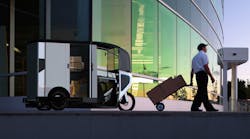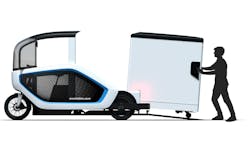Start-up envisions a future of tiny delivery vehicles in quieter, cleaner cities
Changing how goods are delivered in cities could have a cascading effect on the urban landscape. Germany-based startup ONO is looking to do that with a "new category of electric vehicles" designed to carry cargo through busy urban centers. The concept caught the eyes of mobility experts serving on the Movin'On Startup Challenge jury that judged 10 worldwide startup companies during a virtual summit this week.
The Berlin company, which has just 14 employees, is also developing urban logistics solutions for its customers designed to make its three-wheeled e-delivery vehicles more efficient for shippers and crowded cities.
ONO was named the winner in Movin'On's Multimodal Mobility category after virtual live video presentations on June 4 that bounced among companies and judges on five continents. Traditionally held in Montreal, the 2020 Movin'On Summit become a giant live video conference after the COVID-19 pandemic curtailed travel this spring.
"When you think of your typical commute, what comes to mind?" asked Vieran Hodko, the head of brand development and partnerships at ONO in a prerecorded video presentation for Movin'On. "Is it something like getting in your car in the morning, hoping that you won't get stuck in traffic, that maybe you will make that 9 a.m. meeting? But sadly, today, like every other day, you aren't moving. You're getting honked at, and as you lower your window for some fresh air, you get fumes."
Seelbach said ONO — founded in 2016 by CEO Beres Seelbach with Murat Günak, a former head of design at Volkswagen and Mercedes-Benz, and light electric vehicle expert and engineer Philipp Kahle — is "building a better way. Our goal is to create a transformative change in urban mobility. And we're starting with the way goods are delivered in our cities."
The three-wheeled ONO Pedal Assisted Transporter (PAT) features two electric motors that carry interchangeable cargo units featuring more than 70 cubic feet of space. It also has a roof that can protect drivers (who don't need a license to operate the vehicle in Germany) from rain. The company's vision is a future with fewer larger diesel-powered units making last-mile deliveries, which Seelbach said would reduce urban traffic and exhaust fumes.
One of the judges, Jean-Michel Guillon, the chief innovation officer at Michelin, liked the vehicle concept and design. "When we take into account the pandemic crisis, we can see an explosion of the last-mile delivery," he said on June 4. "And OTO introduces an interesting and sustainable alternative for different delivery models."
The ONO PAT has been running pilot tests with German customers since late 2019 and plans to begin full-scale production before expanding to the international market in 2021. Hodko said the company's goal is to deploy about 200 vehicles in the next six to eight months. After that, the company would start rolling out different cargo modules to enter more markets beyond parcel and goods deliveries.
But it's not just about the vehicle. ONO is developing a freight ecosystem featuring "micro-depots" within city centers. PAT delivery drivers would load cargo from micro-depots within the city — as opposed to large warehouses on the outskirts of town. The German company envisions its model creating a more sustainable future for urban residents by reducing the trucks in the cities, which reduces noise and air pollution.
While ONO is primarily focused on the courier, express and parcel delivery market right now, it sees a future for using these PATs to move people in crowded cities.
Hodko said that ONO's ambition is not only to create an e-mobility product but to develop an ecosystem around it. "So we're actually producing with tier one automotive partners, which enables us to sustain a certain quality and capability of the vehicle," he said. "But on top of that, because of the parts and integrations that were done with the vehicle, we can actually create a whole ecosystem with an all-inclusive price, which includes maintenance support, battery swapping and more."
As Michelin's Guillon pointed out, ONO's concept could change the urban landscape in the post-pandemic world.





